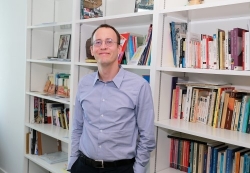HKU-led study tracks 17 languages and finds all languages convey information at similar rates, regardless of whether they are spoken faster or slower
27 October 2019 (Sunday)
HKU-led study tracks 17 languages and finds all languages convey information at similar rates, regardless of whether they are spoken faster or slower

Are some languages more efficient than others? More precisely, are some languages better and faster at conveying what their speakers have in mind?
In a recent study led by the University of Hong Kong (HKU) titled "Different languages, similar encoding efficiency: comparable information rates across the human communicative niche", an international and interdisciplinary team comprising scientists at the Laboratoire Dynamique Du Langage (France), Ajou University (South Korea) and HKU analysed 17 languages and found that all languages convey information at similar rates, regardless of whether they are spoken faster or slower.
The findings have recently been published in academic journal Science Advances.
"Since language is at the heart of most human activities, and one of the cornerstones of human cultures, the temptation has often been to judge and rank human communities according to their mother tongue," said Dr. Christophe Coupe, an Assistant Professor at the Department of Linguistics, HKU who led the study.
"As an example, Western scholars of the 19th century wondered about the richness of Chinese culture given that the Chinese language seemed to them much "simpler" than "refined" languages like French, German or Latin. Mandarin, like many other languages, indeed has no marking for tense or aspect on verbs, no marking of plural, no case system etc., all linguistic features commonly found in Indo-European languages. It may thus appear at first sight simpler than languages with a richer morphosyntax," added Dr Coupe.
Aiming at comparing languages in terms of efficiency, the team analysed a total of 17 languages from 9 linguistic families: Vietnamese, Basque, Catalan, German, English, French, Italian, Spanish, Serbian, Japanese, Korean, Mandarin Chinese, Yue Chinese/Cantonese, Thai, Turkish, Finnish and Hungarian.
Some languages were first found to be spoken faster on average than others: their speakers produced more syllables on average per second. Japanese and Spanish for example, were 50% faster than languages like Vietnamese and Thai.
More precisely, the researchers estimated the average amount of information carried by syllables in each language, using entropy-based measures expressed in bits, following concepts established by C. E. Shannon in the 1940s. They found a trade-off between this information density and speech rate: 'Information-light' languages were found to have higher speech rates, while 'information-dense' languages showed the opposite tendency.
For example, the sentence 'Por favor, quisiera pedir un taxi para mañana a primera hora' in Spanish ('Please take a request for an early-morning taxi') was made of lighter syllables and produced faster on average than the equivalent sentence in Mandarin 'qǐng bāng máng dìng gè zǎo shang de chū zū chē' (请帮忙订个早上的出租车).
"Languages with higher speech rates are not necessarily more efficient than 'slower' languages, since languages also vary in how they pack information, given their phonology and grammar," explained Dr Coupe.
Findings suggest that all languages convey information at similar rates, although they may look very different in terms of structures or speech rates - the studied languages all gathered around an average information rate of 39 bits of information per second.
"Interestingly, this rate is close to the so-called theta rhythms of neurophysiological activity measured in cortical areas, and thus reinforces the idea that theta oscillations may guide speech perception. This points to the possibility of universally shared constraints, both at the cognitive and at the functional level, of human beings in their language capacities," said Dr Coupe.
"Languages are equally efficient because all human beings share the same cognitive capacities, and have the same need when it comes to communication. Such arguments may help to address old but still deep-rooted ideas of superiority or inferiority of some human groups." He added.
For media enquiries, please contact Dr. Christophe Coupe (Tel: 5580 4122, Email: ccoupe@hku.hk) or Ms Rashida Suffiad, Communications and Public Affairs Office (Tel: 2857 8555, Email: rsuffiad@hku.hk)
For the online press release and photos, please visit: http://www.hku.hk/press/news_detail_20079.html
港大語言學者分析17種語言發現
不同語言傳達訊息效率一致
一些語言是否比其他語言「優勝」,更能有效率地傳遞所說話者表達的意思,是語言學者探索的一個經典議題。
一項由香港大學(港大)語言學系助理教授Dr. Christophe Coupe領導,題爲Different languages, similar encoding efficiency: comparable information rates across the human communicative niche的研究發現,不同語言說起來雖然快慢不同,傳遞訊息的速率相若。
研究結果已在學術期刊Science Advances刊登。
研究小組成員包括法國語言動態實驗室(Laboratoire Dynamique Du Langage)、韓國亞洲大學校,以及香港大學的跨學科學者。他們分析了9個語種合共17種語言,包括越南語、巴斯克語、加泰語、德語、英語、法語、意大利語、西班牙語、塞爾維亞語、日語、韓語、普通話、粵語、泰語、土耳其語、芬蘭語和匈牙利語。研究發現,所有語言儘管整體語速有所不同,但皆以相近速率傳遞訊息。
Dr Christophe Coupe說:「語言是人類活動的核心,也是人類文化的基石。一直以來,人們喜歡比較不同母語,試圖藉此衡量不同社群,把他們分等級。」
「十九世紀西方的語言學者曾經對中文心存疑惑,爲何中華文化博大高深,中文相比其它較「細緻」的語言,像法文、德文和拉丁文等,卻來得『簡單』。中文沒有印歐語言一般語言學上的特質,例如動詞不用區分時態,(英語的從前、現在和未來,主動、被動等),動作是否具延續性;沒有眾數、單數之分;也沒有詞格系統(英語的I, me, my, mine)等。因此當對比其他語言的構詞及句構時,中文看似簡單一些。」Dr Coupe補充說。
研究分析的17種語言中,有些說起來明顯比其它的快,説話的人平均每秒所發出的音節較多,舉例說,日語和西班牙語,比較越南語和泰語,語速要快50%。
研究人員又量度每種語言的資料密度(information density),即每個音節所盛載的資料。他們根據克勞德·夏農(Claude Shannon)在1940年代提出的資訊熵(entropy)的概念,以位元(bits)作為量度資訊量的單位,估計每個音節所包含的資訊量。
結果發現資訊密度與語速之間有著相反的關係,即資訊密度較低的語言說得較快,資訊密度較高的語言說得較慢。例如,中文「請幫忙訂個早上的出租車」,普通話是「qǐng bāng máng dìng gè zǎo shang de chū zū chē」,比相同意思的西班牙語"Por favor, quisiera pedir un taxi para mañana a primera hora"說得慢,後者由較多但輕快的音節組成。
Dr Coupe解釋道:「語速快並不代表效率高,因為不同語言因應其語音和文法,在資料整合上均有所差異。」
研究指出,所有語言不論結構語速,幾乎都以相同的速率傳遞訊息,平均每秒鐘傳遞約39 bits的資訊量。
「有趣的是,這個速率十分接近神經生理活動中,在大腦皮層量度到的節奏性theta波,進一步印證了語言感知由大腦theta波震蕩帶導的觀點,也意味著人類的語言能力,在認知和功能的層面上,都有著共同的生理制約因素。」
「人類的認知能力相約,溝通上的需求相似,於是發展出來,不同語言在效率上大致相同。今次的研究結果,或許有助打破有觀點認爲一些群種比其他優勝這些老舊而根深蒂固的偏見。」Dr Coupe總結道。
傳媒查詢,請聯絡:
香港大學文學院語言學系Dr. Christophe Coupe(Tel: 5580 4122, Email: ccoupe@hku.hk),或傳訊及公共事務處Ms Rashida Suffiad(Tel: 2857 8555, Email: rsuffiad@hku.hk)。
新聞稿網上版及照片,請瀏覽: http://www.hku.hk/press/c_news_detail_20079.html
